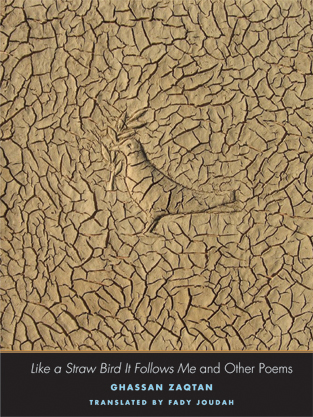Poetry Review: Ghassan Zaqtan’s Haunting Poetics of Suspension
The poetry of Palestinian author Ghassan Zaqtan dwells in the space between life and death, memory and erasure, respite and continuous travel.
Like a Straw Bird It Follows Me, and Other Poems by Ghassan Zaqtan. Translated from the Arabic by Fady Joudah. Yale University Press, 144 pages, $26.
By Kevin Hong
Ghassan Zaqtan’s poems are like shells on a necklace. Each shell is different—it has its own color, texture, and sound when brought to the ear—but ultimately the shells are strung on a single thread. Each shell can stand on its own, but when gathered by the poet (and in this case also by translator Fady Joudah, who sets poems from two previous volumes alongside Zaqtan’s newest book Like a Straw Bird It Follows Me), their collective jingle gives us pleasures and connections that wouldn’t have been possible without reading them together.
In each collection, the poet creates bracelets: small sequences that hold together and, through this concentration, shed light on Zaqtan’s invisibly threading fingers. Reading “The Song of the Drowned,” “The Song of the Betrayed,” “The Song of the First Patrol,” and “Just a Song,” for example, the first of such bracelets, reveals a fixation on doors that continues throughout the volume. Here are a few of my favorite door motifs:
The letters that have not been opened yet
and the dead
return through the door’s opening to steal . . .
from “Additions to the Past”
Thanks because the river flows
and the villages are fruits on the road
and the roads are sleepwalking doors
and sleep is the shadow of death
from “Just a Song”
the door is a slit open and breath enters through the cracks, the river’s
respiration . . .
from “Black Horses”
A laugh of sand will sprout with the door is opened
from fear’s angle, a hymn
for the grand winter, and the voices
of those who left long ago will jump like grasshoppers
when the door is opened.
from “Wolves”
And pretexts
if only you knew
open a door
and close another shut.
from “Pretexts”
For Zaqtan, there is always something breathing on the other side of the threshold, dead or alive. It becomes clear when examining this group of shells that the poet’s preoccupation with thresholds, shadows, and other transitional images comes from his concern for liminality. In the translator’s preface, Joudah writes that “the shifts in Zaqtan’s poetry . . . seem to have one central catalyst in common: recurrent doubt.” The oscillation of recurrent doubt manifests itself in Zaqtan’s poetry through different forms of liminal spaces, and these spaces become one of the threads that run through the poet’s necklace and also defines his prosody. When does a threshold begin and end? When does a death begin and from how far away? When does something you said to me become part of me, become mine? Where is home when one is constantly on the road?
Regarding his people, the Palestinian poet declares, “The endings are not ours / not anyone’s.” But Zaqtan’s poetry eschews the political and the ethical. By navigating thematic and prosodic liminal spaces, he examines states of being in quotidian life with the patience and care of a jeweler. His poetry dwells in the space between life and death, memory and erasure, respite and continuous travel. Settling on one of the two sides of the same coin can easily confuse and mislead us; Zaqtan recognizes this in his long poem “Alone and the River before Me”:
Hunters who have other motives in the light
other labyrinths
and paths that make a hyena huff
and the signifier and the signified get lost
I cull the jewelry metaphor from the poem “Wolves,” in which Zaqtan writes, “there’s in our trace / a reckless lament / and a ceramic bird . . . / and watch for the necklaces on the ceiling.” (Note how the short lines and ellipses, characteristic of Zaqtan’s work, slow us down, encouraging us to contemplate each line as its own utterance.) Later, in “Song of the Orchard’s Watchman,” bracelets make an appearance: “his mattress is out of his dead wives’ bracelets / and in his purse is his fugitive wife’s head.” There is also a panoply of circle imagery, like this excerpt, also from “Song of the Orchard’s Watchman”:
The dervishes were throwing their bodies into the circles
water used to come from stone
stone chased the summer down
summer was of the sun’s making
and the sun was with its kin
This is how a self is taken!
Zaqtan’s verse mimics the dervishes’ circularity; the repetition of “stone,” “summer,” and “sun” spins the reader down the verse paragraph, and the slant rhyme of “stone” and “down” is neatly cadenced at the other end by “kin” and “taken.” Yet, despite this dervish-y movement linking the lines, the poet emphasizes the integrity of each line; each is an independent statement whose profundity lifts it into its own altitude (see also “Just a Song”). Translator Joudah remains faithful to the jeweler’s process in this translation, taking care to tie off space between the lines but also making sure to link them together, carving sounds and patterns that deftly resonate. Zaqtan’s exploration of liminality has heavily influenced his prosody: each line is flanked by silence, but silence also draws the lines together, acting as the threshold from shell to shell. Zaqtan also generously employs ellipses to this end, and they even look like beads on a string:
The only
remaining
ploy
now
is
silence
. . .
that’s what he liked to say
while setting
aside
their taut pastorals
from “The Islands”
This careful stringing can be heard when Zaqtan reads from his own work. We may not be able to understand the Arabic, but it is evident that the poet respects each line, allowing each one of his utterances to ring. He makes sure to punctuate the end of each line with a white space that allows the previous line time to reverberate while pulling the listener further into the poem, toward the next line. Zaqtan’s gesticulations are also fascinating to follow. His hands never fail to emphasize each line with some sort of flourish: sometimes it is a prodding index finger or a clenched fist or an open hand that carries the poet’s breath from his mouth.
But I’m most interested in the moments when Zaqtan extends his hand as if holding some sort of round object; he tests the orb’s weight, turns it over, and like a magician, he transmogrifies it or makes it disappear. The poet’s magic lies in his silence, the space between his lines drives their independence as well as their power of transformation.
In effect, the liminal space in Zaqtan’s verse is a mechanism for a constant metempsychosis, the transmigration of souls. The myriad ghosts that haunt his poems pass through doors and windows, changing form; we can see Zaqtan’s lines as thresholds that open and close. The threshold is an object in itself, but it is also a moment of transition to another space. Zaqtan’s readers move from line to line along a road of silence, encountering transition after transition—as the poet writes, “the roads are sleepwalking doors”—and Zaqtan’s dead haunt the silence, always on the tip of the tongue: “the woman in the phone booth is crying / someone is sending ghosts through the other end.”
Zaqtan’s poetry is a poetry of unrest and constant migration; there is no end to the circle of shells. Tonally, this creates a two-way push: in one direction, there is a lament for the lost and the dead, and in the other, there is a wish to erase the collective memory. In his poem “This is My Only Profession,” Zaqtan writes of his palliative obligation “to author a bend in the story / so we can prolong the evening / or make predictions / and make matters bearable . . . .” Yet in the beautiful poem “Remembering Weeping,” the speaker’s tears takes the form of a loved one, and he cries so much that he weeps for the sake of weeping. The weeping is ultimately what sustains him; like a loyal wolf, his tears say, “‘I split my food for the two of us / to the light of fire or through the smoke.’” Sorrow becomes sustenance, fed by the smoke that is sure to sting the eyes.
Sitting between this two-way push is Zaqtan’s recurrent doubt. It is a form of silence that lies between and around everything; it propels and suspends, transforms and remains constant. To Zaqtan, “silence is the caller’s icon”; noise is merely a reflection of silence, a door that leads from white space to more white space. For the poet, the liminality of the blank page becomes just as important as his lines. It is frightening, but also preservative:
Your voice in my room exhausts the silence
the silence of pots
the silence of shelves
the silence of writing
the silence of lighting
and the silence of survival
from “Wolves”
The accumulation of silence, “the absence / that never stops,” becomes a weighty presence in Zaqtan’s poetry. Perhaps knowing this space is the poet’s profession; perhaps it makes reality more bearable.


